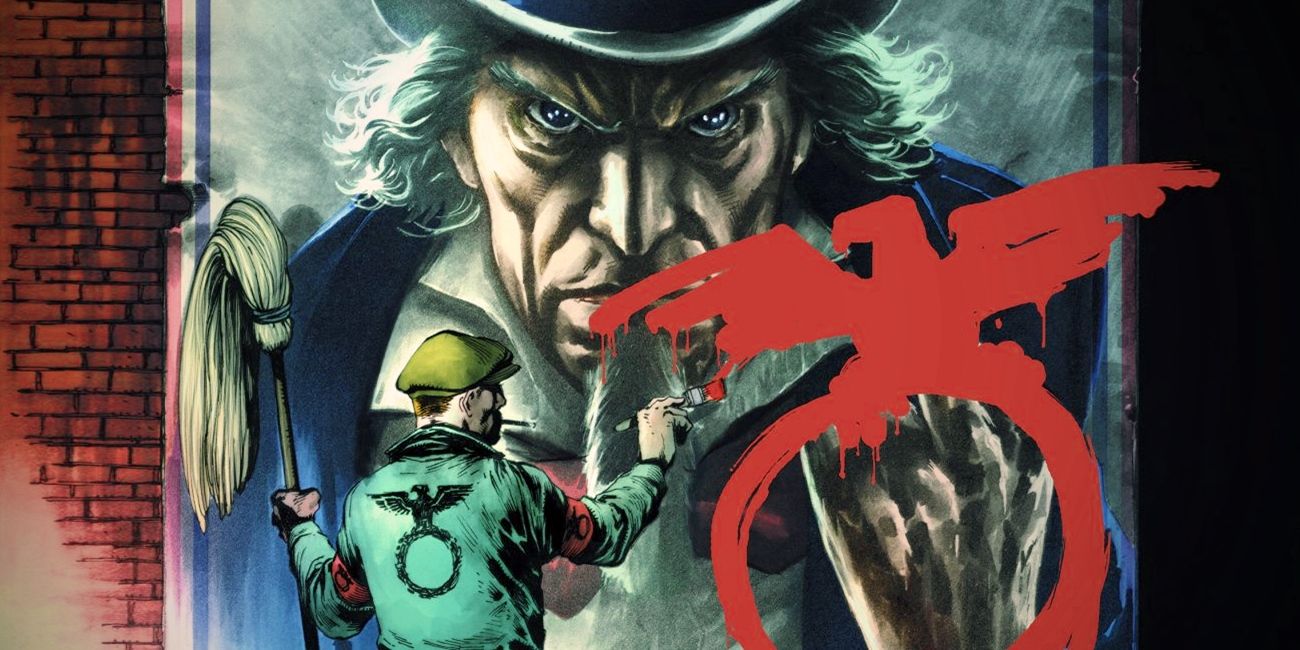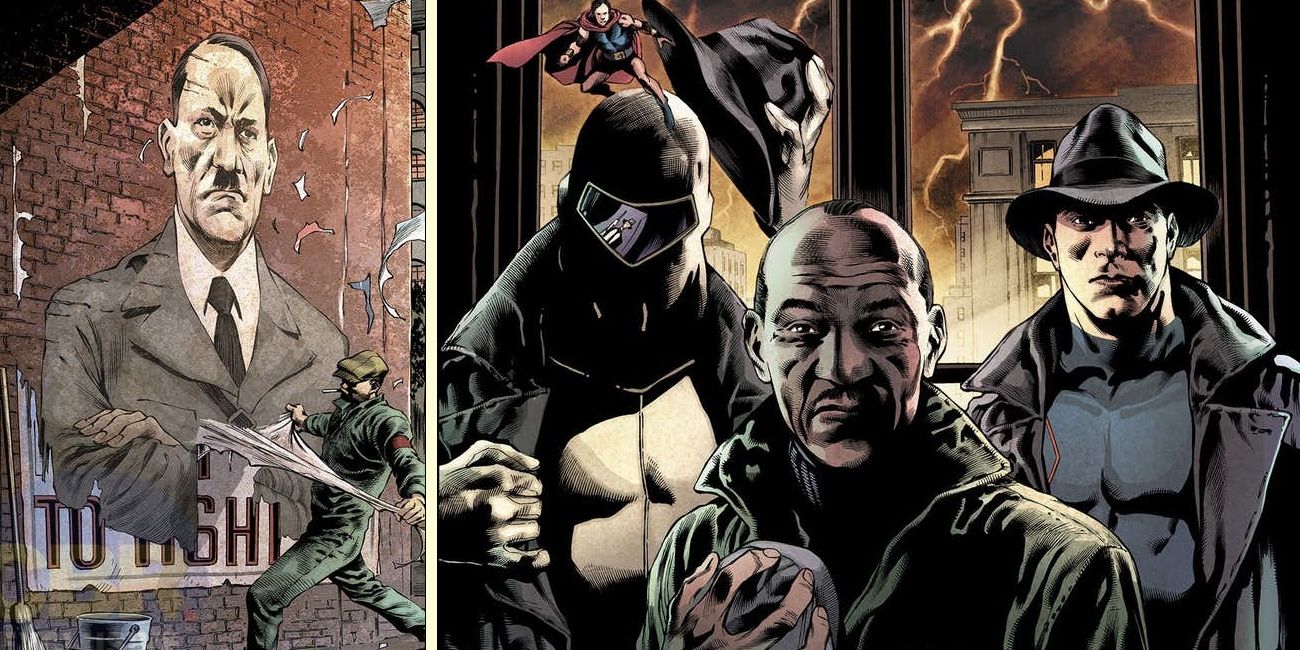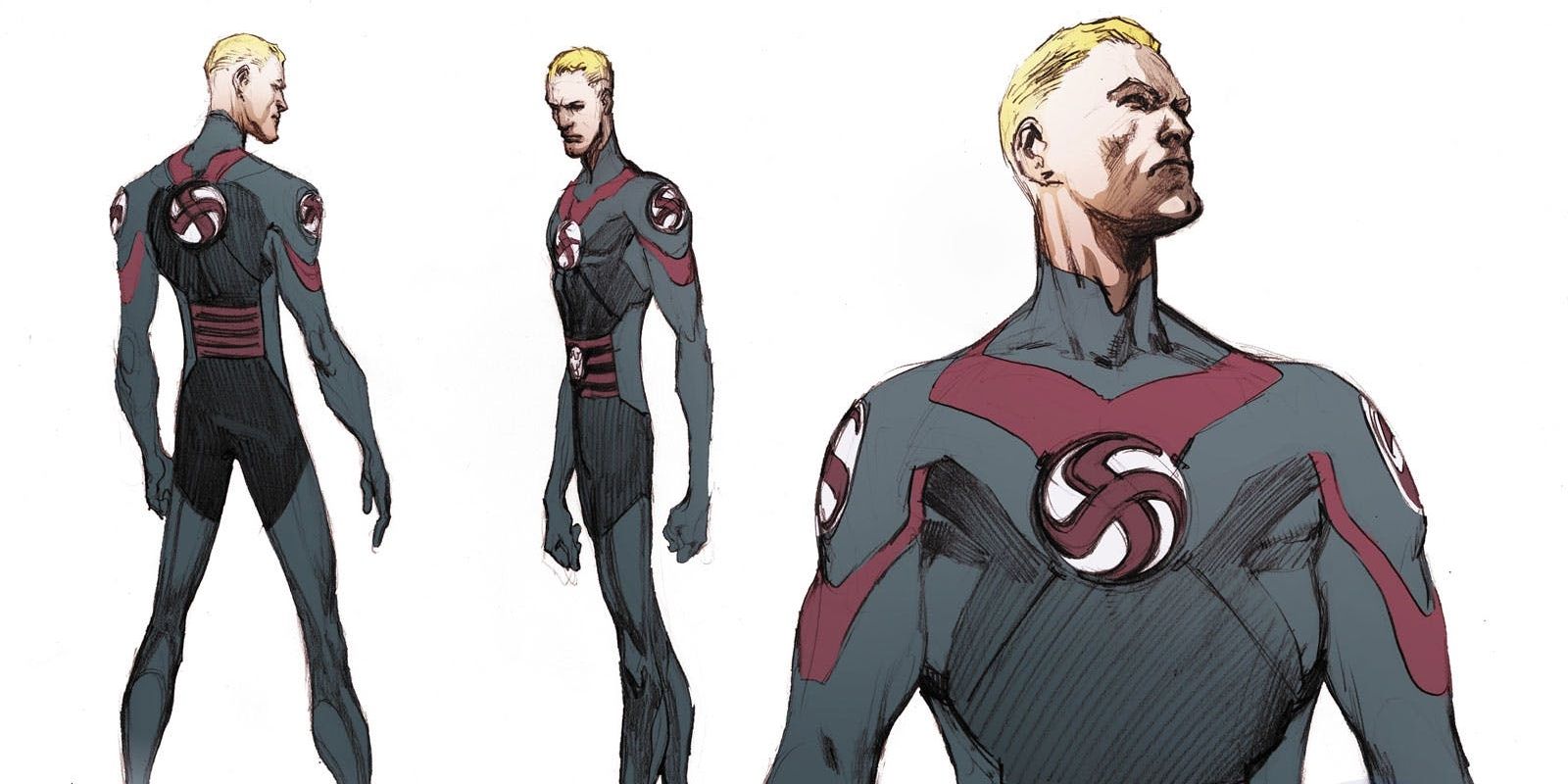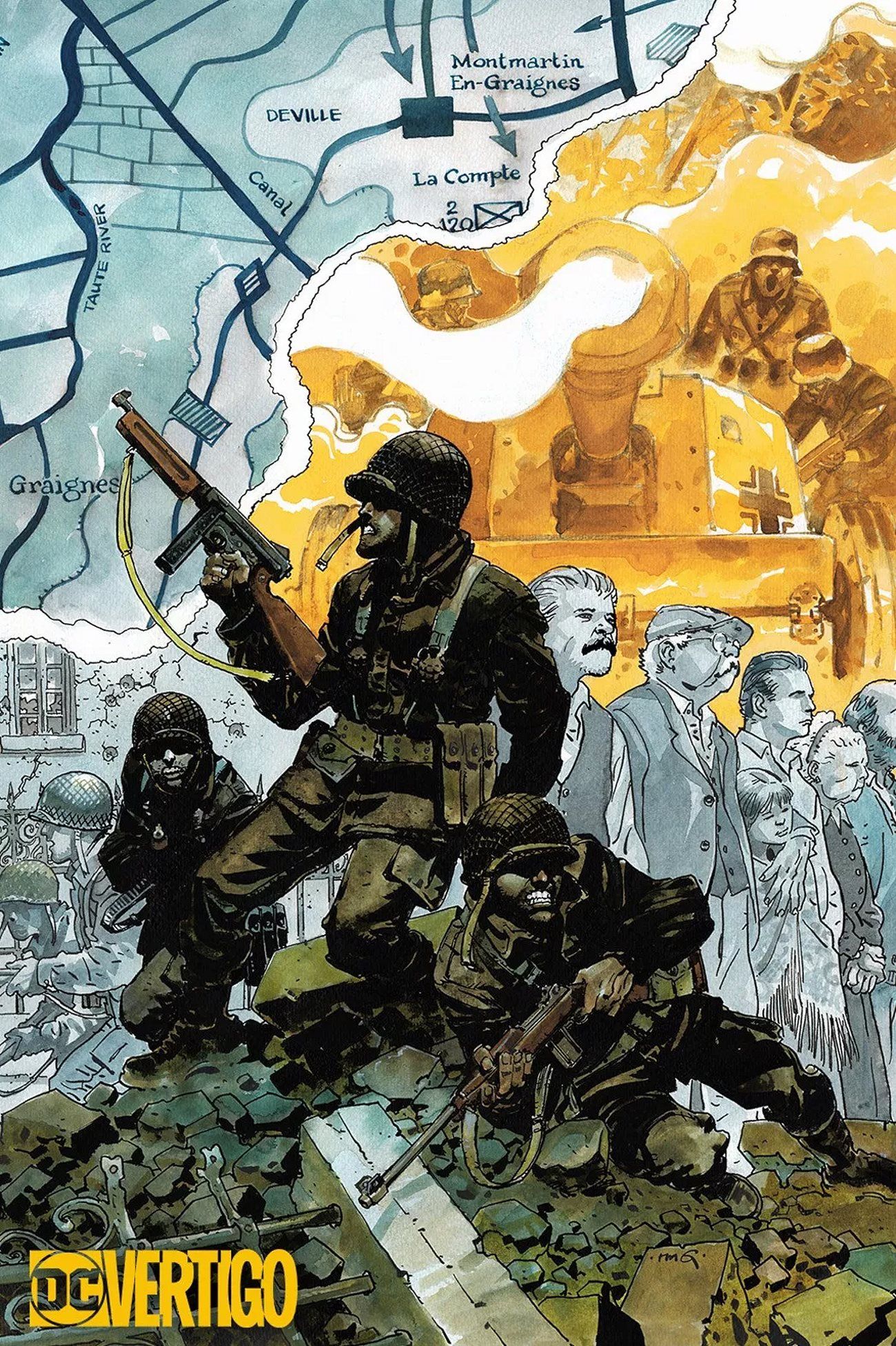https://ift.tt/2QYQJLa 

The classic team of Nazi-hating Freedom Fighters are returning to the DC Universe in their very own comic book, encouraging readers to ask one question: if Adolf Hitler had won World War II... what heroes would rise against America's Nazi Regime in 2018?
The question may be more loaded than ever, but writer Robert Venditti and artist Eddy Barrows are answering it by creating an entirely new world within the DC Multiverse. Fans may have met Uncle Sam and the Freedom Fighters in past incarnations, or even traveled to the Nazi-ruled "Earth X" in the Arrowverse crossover. But fans haven't faced a nightmare like the modern world introduced in Freedom Fighters #1, taking place fifty years into Nazi America. although... they haven't seen the kind of heroes rising to finally bring it toppling down, either.
RELATED: The Justice League is Heading to DC's Hawk-World
Screen Rant got the chance to speak with writer Robert Venditti about the launch of Freedom Fighters #1, and why now is the perfect time for their story of resistance to fascism to be retold. With influences drawn from the Nazi secret police, the famous Olympian Jesse Owens, and Venditti's own family connection to World War II, this isn't your typical comic book reboot.
Screen Rant: I have to say, I'm feeling patriotic after reading Freedom Fighters #1, even though I'm Canadian.
[Laughs] Well... Welcome to America, I guess!
There's going to be some fans familiar with the premise of Earth X after the Arrowverse TV shows headed there in a crossover, and maybe they've seen the Freedom Fighters in one of their previous comic reboots. Can you explain how this series is going to be starting fresh, or honoring what came before?
We're going to be doing a lot of those things. We are going to be honoring prior iterations of these characters, whether it be the 1970s version or the version we saw most recently, the new team that was established in the Multiversity story that Grant Morrison oversaw. We'll be doing both of those things, but it is an alternate version of Earth. It is set on Earth X, which is the version of Earth where the Nazis won World War II. We start off in the 1960s as sort of the last gasp of America trying to regain its freedom from the Nazis. That fails, and then we go into the present from there, into the modern day where we have this new team of Freedom Fighters made up of all new characters who are picking up the mantle of not just that team name, but of the heroes who who used to represent that team.
Black Condor, Human Bomb, Phantom Lady, Doll Woman, and we have some new characters as well. They are taking it upon themselves, after fifty years, to try to remind people what America is meant to be. And stoke that American spirit with the hopes of bringing back Uncle Sam, who is the physical embodiment of the American spirit. And begin a new revolution that would overthrow the Nazi regime and make America free once more, that's our entry point for the series.

I have to ask you about your decision to introduce the new leaders of the 1960s Freedom Fighter. The "most wanted man" by Hitler's regime in America.
Jesse Owens. It just seemed to me... my first conversation about the Freedom Fighters with DC... it is a concept that these aren't characters that are necessarily household names. It is an alternate version of planet Earth, so even the world outside your door isn't necessarily familiar. I'm always trying to think very hard about entry points, and as someone who didn't grow up reading comics and had to find my way through these mythologies during some cumbersome eras, I always try to think about what the entry point is for a reader, and how they'll be able to grasp a concept, no matter how complicated, as quickly as possible, you know? For example with a character like Hawkman, he reincarnates across time and space. Pretty easy idea to grasp, right? Five words. You kind of get the hang of it, 'Oh reincarnates across time and space, got it. Let's go on with the story.' For me, I needed to have an entry point to the series that would really let readers understand where we are, and what America is like in this environment.
And it just seemed to me that in order to write a series like this, you really have to occupy a head-space where you have to imagine the darkest possible things you can think of, because that's the way the world would be. If Hitler had won, and we were fifty years into a Nazi regime. It seems to me that one of the very high things on his to-do list, if Hitler had won World War II, would be to go find Jesse Owens and make an example of him. Because of the way Jesse Owens had performed at the Berlin Olympics in front of Hitler, and humiliated him on the world stage. And basically, through athletics, deconstructed his entire worldview [laughs]. On a global stage, you know? Hitler would not let that stand. Priority number one would be, 'We gotta find this guy, we gotta make an example of him, so that I can finally get him back,' or whatever you want to say.
It seemed to me like that was a very realistic conclusion to make, of what the world would be like. And again, communicate that this is an alternate version of Earth where these things have happened. We all know who Jesse Owens is, so to put a character like that in this situation and build it around that, lets everybody kind of understand this is where the world is right now.

You refer to Hitler, but the new Freedom Fighters series asks readers to wonder: what if Hitler didn't just refer to a man, but a dynasty? It's hinted at in the first issue, but is that idea of Hitler's heirs going to be a big part of the story to come?
Very much so. Now that we're in 2018, Hitler - you know, the original Adolf Hitler the First - has passed away. It is his son, Adolf Hitler II who is now the leader of a Nazi regime in America. And there is an Adolf Hitler III, a grandson, who is a large part of the series as well. A large part of the series has not just been building out the heroes and establishing who they are, but creating villains and establishing who they are as well. Because your heroes have to be tested.
Beyond even the Hitler Dynasty we have other versions of things. Like the PlaSStic Men, which are these Plastic Man-inspired, SS infiltrators that can shape-shift and look like anything and anyone, and are the ultimate secret police. And then we have these giant robots called the Bozos, the Iron Police that patrol like walking tanks. There's far more things that we're going to do as well. It's a lot of building mythology, and creatively it's what can be very exciting about a story like this, is you're not just creating a plot, or creating a new situation for an existing hero. We are really building out new heroes, we are building out new villains, we are literally creating an entire new society, an entire new planet that we're dealing with. And building with that from the ground up. So you really are doing world-building in the truest sense of the word.
In the first issue, we're still dealing with superheroes in a comic book narrative. But people are going to attach politics to it, and put words in your mouth, certainly. Are your prepared for that, or do you just have to focus on the story you're trying to tell?
I just have to tell the story that I'm trying to tell, and be true to the characters in that world. Throughout my entire career going all the way back to The Surrogates, which came out in 2005, I've always used as a guiding principle on everything that I've done, to let my characters do the living, and the talking, and the acting. And have the readers see those characters first, and not see me, if that makes sense. Of course anything I write people are going to apply certain things to, but that's up to the audience to do those things. My job is to tell a story with these characters and with these villains, and portray it honestly, according to the rules of the world that we're building. Beyond that, it's in the reader's hands.

The first issue poses the question, characters in the comics ask it, and people are going to be asking, ' Why now?' What has changed? Obviously you're not going to spoil that, but that is a question you want readers to be asking.
Yeah, for me a large part of what the series is about on a thematic level is how heroism never dies. It can feel like it's gone, it can feel like it's been wiped out, it can feel like there's no hope. But there will always be people who are good and who won't stand for it, and who take it upon themselves. And even in our darkest moments, often that's when the brightest individuals present themselves. I believe that firmly. That's really an overarching theme for the series, among some of the other themes that we're dealing with as well. Now, are you asking 'why now?' within the context of the story, or asking why make this story now, from my perspective as a writer?
Well, both.
Okay. Well, that's the in-world reason for why the Freedom Fighters are returning. Now for me as a writer, why do the story now? It was interesting, when DC approached me about doing Freedom Fighters I was already working on another project that will be coming out from Vertigo in May of next year. This is a non-fiction story about my uncle's involvement in the D-Day invasion, and a battle that he was killed in. My family never knew what had happened to him, we had a telegram that said he had died on a certain day somewhere in France, but we didn't know the circumstances, we didn't know the location. I ended up finding out through a letter I found, the details of my uncle's death, and where he died. It was around the same time that I was working on the project, writing my first non-fiction piece - which I'm co-writing with author Kevin Maurer - that DC presented this.
It was another way to sort of approach material that I was already dealing with. I was dealing with it on a very factual basis, and trying to get things right for this SIX DAYS graphic novel, and now here comes an opportunity to look at that same material but flip that coin, you know? Look at it from the darkest imagining of what could have been the result of that situation, if World War II had gone differently. Coming up on the 75th anniversary of D-Day next year, it just seems like a really appropriate time to be examining that material, and looking backwards at history, and applying it to where we are now, and our worldview.
SIX DAYS is timed to come out right before the 75th anniversary of D-Day. My uncle was in the 82nd Airborne, and that was the battle he died in. He was one of the worst missed drops. He was part of a group that was one of the worst missed drops of all of D-Day, so they ended up the farthest away from where they were supposed to be, and the farthest behind enemy lines. That's co-written with Kevin Maurer, and Andrea Mutti on art, and Lee Loughridge on colors.
Freedom Fighters #1 will be available December 19th from DC Comics. Six Days will be released by Vertigo starting May 14th, 2019.
MORE: How DC's METAL Sets The Stage For Hawkman's Rebirth
from ScreenRant - Feed https://ift.tt/2Gnn3TL
via IFTTT



0 Yorumlar